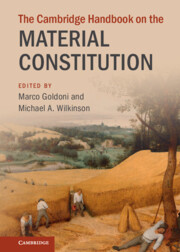Book contents
- The Cambridge Handbook on the Material Constitution
- The Cambridge Handbook on the Material Constitution
- Copyright page
- Contents
- Contributors
- Introduction
- Part I History
- 1 The Tradition of the Material Constitution in Western Marxism
- 2 The Soul of the State
- 3 Laski’s Materialist Analysis of the British Constitution
- 4 Rudolf Smend’s Legacy in German Constitutional Theory
- 5 The Constitution in the Material Sense According to Costantino Mortati
- 6 The Material Constitution of the Dual State
- 7 ‘A Certain Shadowy Totality’
- 8 The Material Constitution in Greek Constitutional Thought
- 9 The Constitution As Social Compromise
- 10 ‘Self-Justifying Law of Constitutional Law’
- Part II Challenges
- Part III Analyses
- Index
9 - The Constitution As Social Compromise
Hybrid Constitutionalisation and the Legacy of Wolfgang Abendroth
from Part I - History
Published online by Cambridge University Press: 15 January 2023
- The Cambridge Handbook on the Material Constitution
- The Cambridge Handbook on the Material Constitution
- Copyright page
- Contents
- Contributors
- Introduction
- Part I History
- 1 The Tradition of the Material Constitution in Western Marxism
- 2 The Soul of the State
- 3 Laski’s Materialist Analysis of the British Constitution
- 4 Rudolf Smend’s Legacy in German Constitutional Theory
- 5 The Constitution in the Material Sense According to Costantino Mortati
- 6 The Material Constitution of the Dual State
- 7 ‘A Certain Shadowy Totality’
- 8 The Material Constitution in Greek Constitutional Thought
- 9 The Constitution As Social Compromise
- 10 ‘Self-Justifying Law of Constitutional Law’
- Part II Challenges
- Part III Analyses
- Index
Summary
The contribution provides a reconstruction of Wolfgang Abendroth’s approach to the constitution as ‘social compromise’. It clarifies the historical background and asks for its potential with regard to current challenges of constitutionalisation. In the initial part, it is demonstrated how the concept of ‘balance of social forces’ was used in the context of the labour movement in Austria and Germany in order to approach constitutional issues. Then, it is argued that this approach can make sense of the subsequent evolution of constitutionalism and international law after the second-world war. It is argued, however, that its main weakness consists in the focus on the central role of industrial labour within social conflicts: The constitutional compromises were often affected or even shifted by unforeseen agents of change which exceeded the sphere of blue-collar workers. Finally, the contribution addresses how Abendroth’s approach can be used in order to refine current attempts to re-establish a ‘balance of social forces’ through either hybrid constitutionalisation (sociological constitutionalism) or counter-institutions (plebian constitutionalism).
- Type
- Chapter
- Information
- The Cambridge Handbook on the Material Constitution , pp. 136 - 149Publisher: Cambridge University PressPrint publication year: 2023

